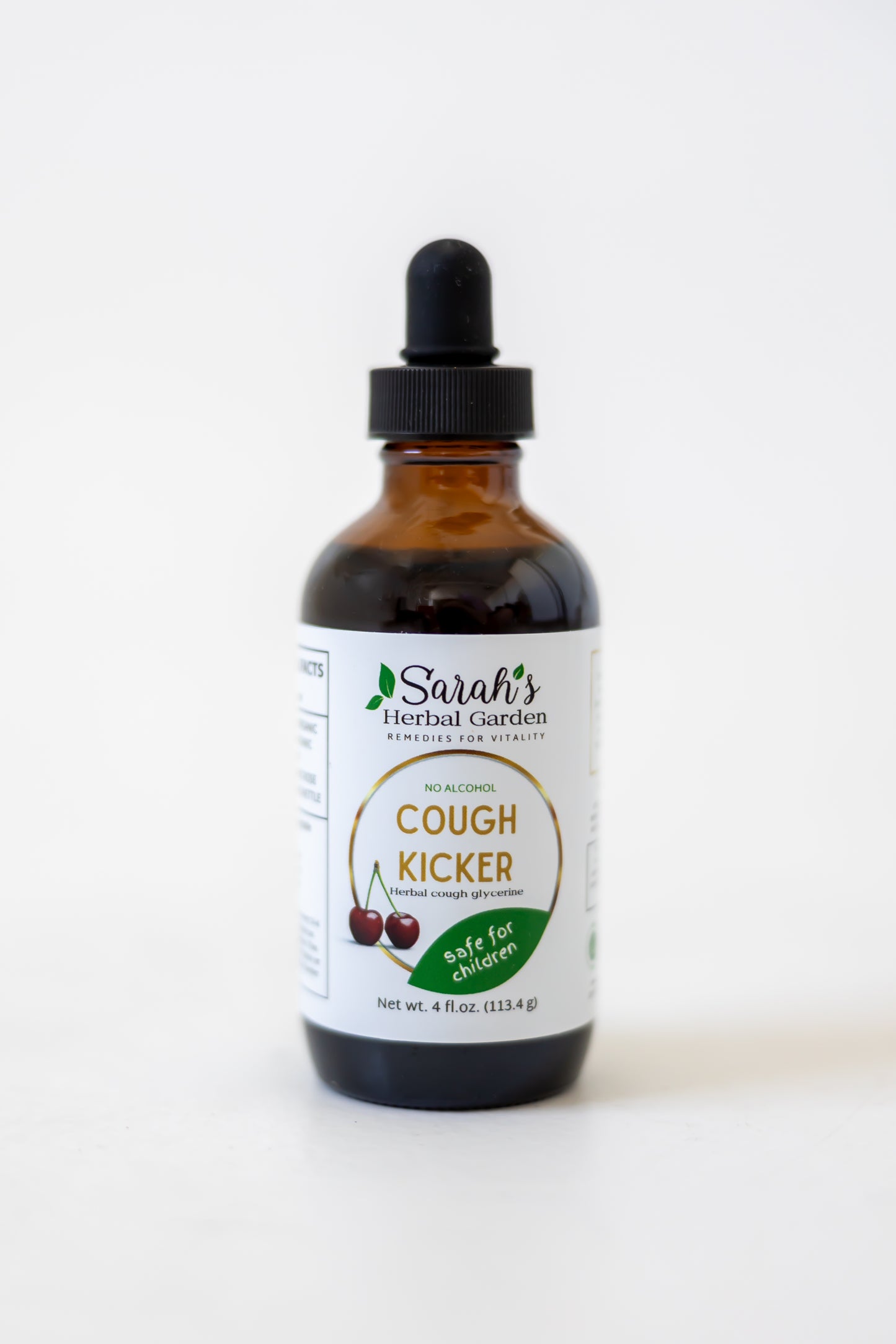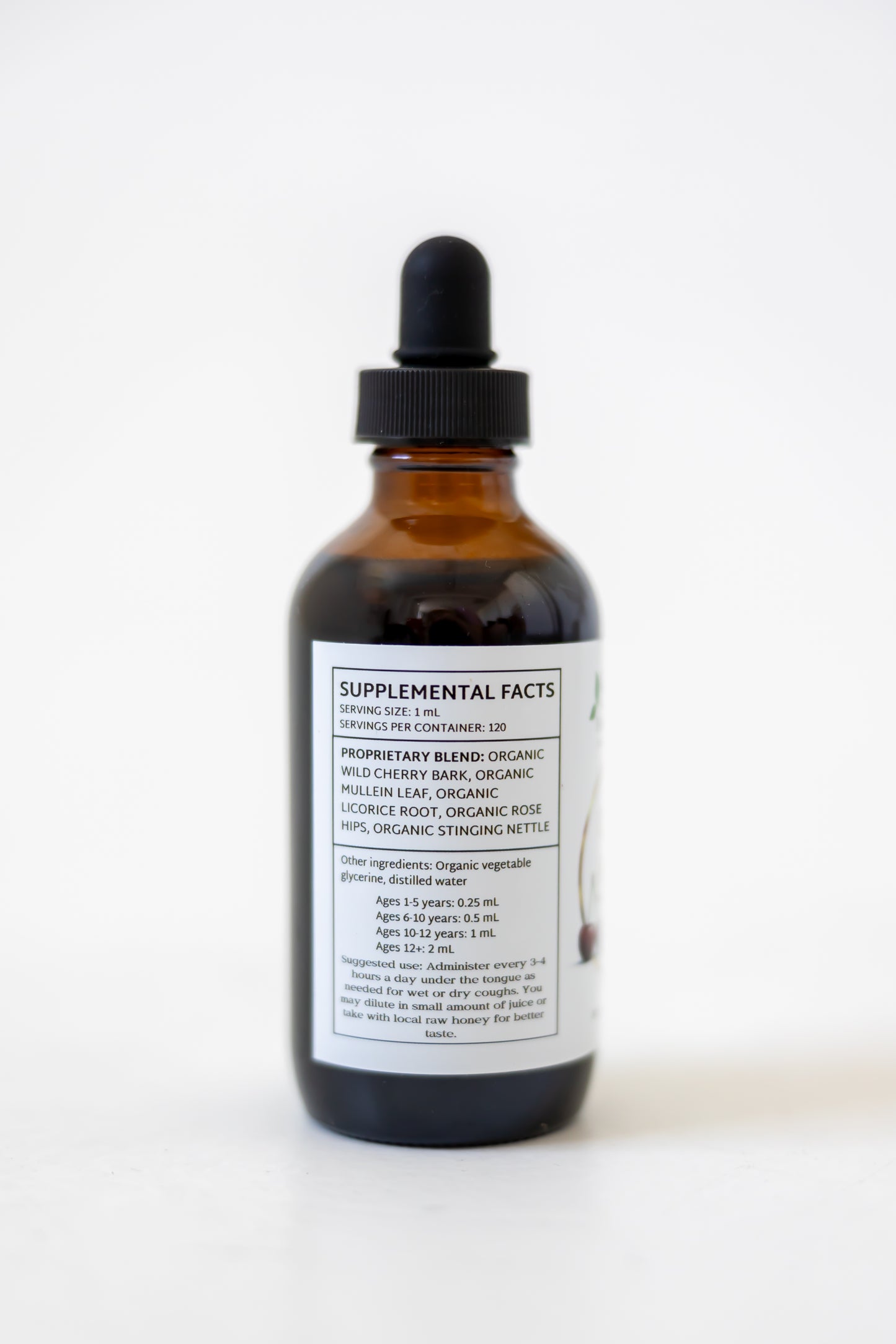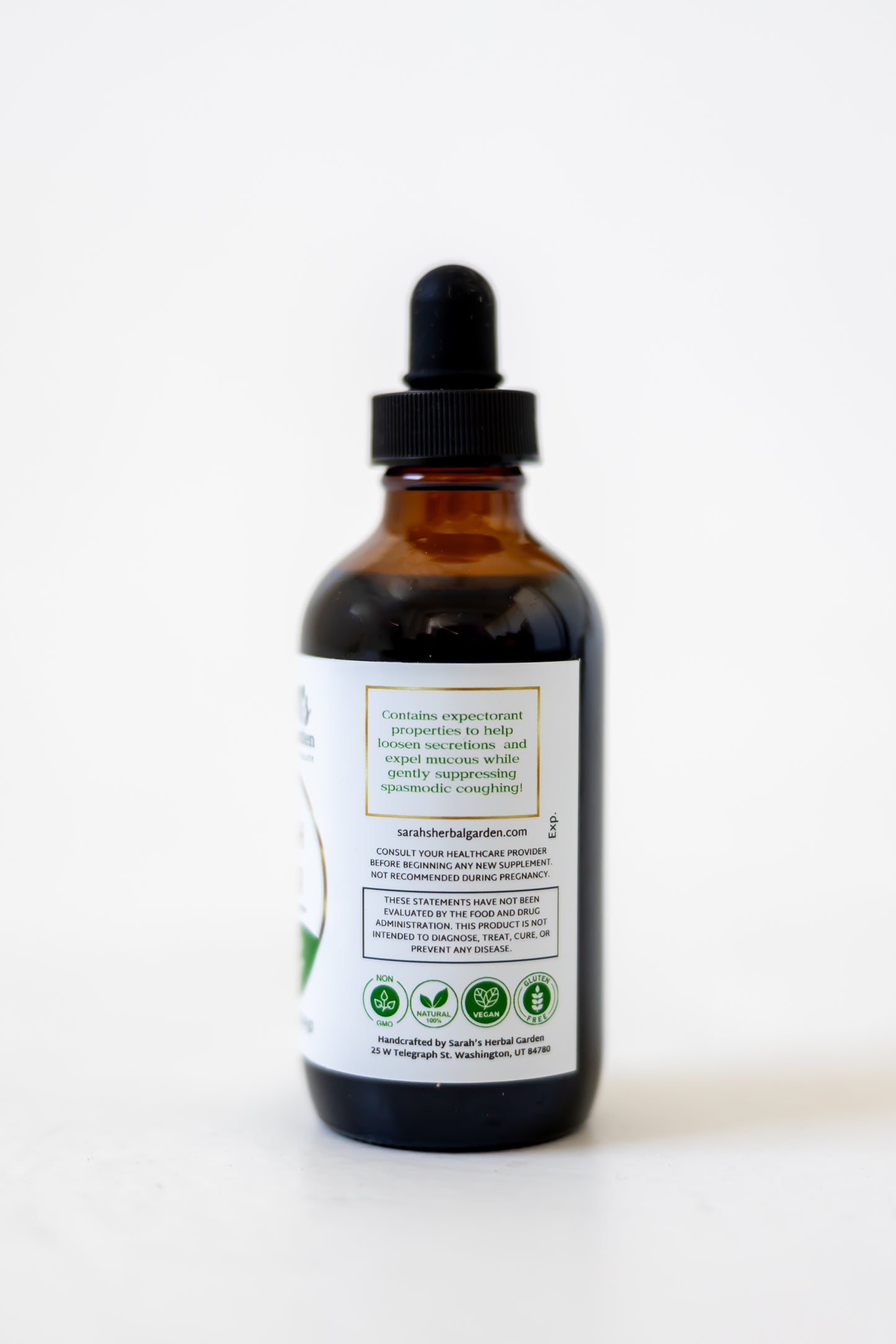Sarah's Herbal Garden
Cough Tincture
Cough Tincture
Couldn't load pickup availability
Glycerite Tincture
Wild cherry bark is the hero in this formula. This formula contains so many valuable properties!
- Cough support: Wild cherry bark is well-known for its cough-reducing properties. It may help soothe persistent coughs.
- Respiratory Health: Beyond cough support, wild cherry bark can help reduce irritation in the respiratory tract.
- Anti-inflammatory Properties: The bark contains anti-inflammatory compounds that can help reduce inflammation in the throat and respiratory system, soothing irritation.
- Digestive Support: Wild cherry bark can help soothe digestive issues.
- Pain Support: Wild cherry bark may help reduce pain associated with sore throats and minor injuries.
- Antioxidant Properties: The bark is rich in antioxidants, which help protect the body’s cells from damage caused by free radicals and support overall health.
- Fever Support: Wild cherry bark can help reduce fever.
These statements have not been evaluated by the Food and Drug Administration. This product is not intended to diagnose, treat, cure, or prevent any disease. Consult with healthcare provider if pregnant or breastfeeding, have any underlying health conditions, beginning an herbal supplement for the first time, or are taking other medications.
Share



Herbs used in this formula

Wild Cherry Bark
Wild cherry bark is a wonderful, natural way to find relief from those annoying coughing fits! Here are some amazing properties of wild cherry bark:
1. Cough Suppressant
- Soothing Effect: Wild cherry bark contains compounds that have a soothing effect on the respiratory tract, helping to reduce the urge to cough.
- Natural Cough Suppressant: It acts as a natural cough suppressant, helping to calm cough reflexes and providing relief from persistent coughing.
2. Expectorant Properties
- Clearing Mucus: Wild cherry bark can help loosen and expel mucus from the respiratory tract, making it easier to cough up and clear out congestion.
- Improving Respiratory Health: By aiding in the removal of mucus, it helps improve overall respiratory health and function.
3. Anti-Inflammatory Properties
- Reducing Inflammation: Wild cherry bark contains anti-inflammatory compounds that can help reduce inflammation in the throat and respiratory passages, providing relief from irritation and swelling.
- Soothe Irritated Tissues: The anti-inflammatory effect helps soothe irritated tissues in the respiratory system, reducing the discomfort associated with coughing.
4. Antioxidant Benefits
- Protecting Respiratory Tissues: The antioxidants in wild cherry bark help protect the tissues of the respiratory tract from oxidative stress and damage, which can be exacerbated by infections and persistent coughing.
- Boosting Immune System: These antioxidants also support the immune system, helping the body fight off respiratory infections that can cause coughing.
5. Mild Sedative Effect
- Relaxing the Body: Wild cherry bark has mild sedative properties that can help relax the body and promote restful sleep, which is important for recovery from respiratory illnesses.
- Reducing Cough Reflex: The relaxing effect can also help reduce the frequency and intensity of cough reflexes.
Mullein Leaf
Mullein is a traditional herbal remedy used to treat respiratory conditions, including coughs. Here’s how mullein can help alleviate coughs:
1. Expectorant Properties
- Mucus Clearance: Mullein acts as an expectorant, helping to loosen and expel mucus from the respiratory tract. This makes it easier to cough up phlegm and clear the airways.
- Relieving Congestion: By aiding in the removal of mucus, mullein helps relieve chest congestion, which can reduce the frequency and severity of coughing.
2. Anti-Inflammatory Properties
- Reducing Inflammation: Mullein contains anti-inflammatory compounds that can help reduce inflammation in the respiratory tract. This helps soothe irritated tissues in the throat and lungs, providing relief from the discomfort associated with coughing.
- Soothing Irritation: The anti-inflammatory effects help calm the respiratory passages, which can reduce the irritation that triggers coughing.
3. Demulcent Effects
- Coating and Soothing: Mullein has demulcent properties, meaning it can form a soothing film over mucous membranes. This helps protect the lining of the respiratory tract and throat, reducing irritation and dryness that can lead to coughing.
- Moisturizing the Throat: The mucilage in mullein helps keep the throat moist, which can prevent dry coughs and ease the coughing reflex.
4. Antibacterial and Antiviral Properties
- Fighting Infections: Mullein has mild antibacterial and antiviral properties, which can help combat respiratory infections that cause coughs. This makes it useful for treating coughs related to colds, flu, and other respiratory infections.
- Supporting Immune Health: By helping to fight off infections, mullein supports overall respiratory health and aids in quicker recovery from illnesses that cause coughing.
5. Relaxing Respiratory Muscles
- Muscle Relaxation: Mullein can help relax the muscles of the respiratory tract, reducing spasms that can cause persistent coughing.
- Easing Breathing: The relaxing effect can make breathing easier, which is especially helpful during bouts of coughing.
Licorice Root
Licorice root is AWESOME for respiratory ailements. Here’s how licorice root can specifically help alleviate coughs:
1. Expectorant Properties
- Mucus Clearance: Licorice root acts as an expectorant, helping to loosen and expel mucus from the respiratory tract. This makes it easier to cough up phlegm and clear the airways.
- Relieving Congestion: By aiding in the removal of mucus, licorice root helps relieve chest congestion, which can reduce the frequency and severity of coughing.
2. Anti-Inflammatory Properties
- Reducing Inflammation: Licorice root contains compounds such as glycyrrhizin that have anti-inflammatory effects. This helps reduce inflammation in the respiratory tract, soothing irritated tissues in the throat and lungs.
- Soothing Irritation: The anti-inflammatory effects help calm the respiratory passages, reducing the irritation that triggers coughing.
3. Demulcent Effects
- Coating and Soothing: Licorice root has demulcent properties, meaning it can form a soothing film over mucous membranes. This helps protect the lining of the respiratory tract and throat, reducing irritation and dryness that can lead to coughing.
- Moisturizing the Throat: The mucilage in licorice root helps keep the throat moist, preventing dry coughs and easing the coughing reflex.
4. Antiviral and Antibacterial Properties
- Fighting Infections: Licorice root has antiviral and antibacterial properties, which can help combat respiratory infections that cause coughs. This makes it useful for treating coughs related to colds, flu, and other respiratory infections.
- Supporting Immune Health: By helping to fight off infections, licorice root supports overall respiratory health and aids in quicker recovery from illnesses that cause coughing.
5. Immune System Support
- Boosting Immunity: Licorice root can help boost the immune system, making the body more effective at fighting off the pathogens that cause respiratory infections and coughs.
Rose Hips
Rose hips, the fruit of the wild rose plant, are rich in vitamins, antioxidants, and other beneficial compounds that can help alleviate coughs and support respiratory health. Here’s how rose hips can help with a cough:
1. High Vitamin C Content
- Immune Support: Rose hips are exceptionally high in vitamin C, which is crucial for a healthy immune system. A strong immune system can help fight off infections that cause coughs, such as colds and flu.
- Antioxidant Protection: Vitamin C is also a powerful antioxidant that helps protect respiratory tissues from damage caused by free radicals, reducing inflammation and supporting healing.
2. Anti-Inflammatory Properties
- Reducing Inflammation: The anti-inflammatory compounds in rose hips, including flavonoids and polyphenols, can help reduce inflammation in the respiratory tract. This helps soothe irritated tissues in the throat and lungs, providing relief from the discomfort associated with coughing.
- Soothing Irritation: By reducing inflammation, rose hips can help calm the respiratory passages and decrease the frequency and severity of coughs.
3. Antioxidant Effects
- Protecting Respiratory Tissues: The antioxidants in rose hips, such as carotenoids and flavonoids, help protect the tissues of the respiratory tract from oxidative stress and damage, which can be exacerbated by infections and persistent coughing.
- Supporting Healing: These antioxidants also support the body’s natural healing processes, helping to recover from respiratory illnesses more quickly.
4. Immune-Boosting Properties
- Enhanced Immune Response: In addition to vitamin C, rose hips contain other immune-boosting compounds, such as vitamins A and E, which help strengthen the body’s defenses against respiratory infections.
- Preventing Secondary Infections: A stronger immune system helps prevent secondary infections that can develop as a result of a primary respiratory infection.
5. Mild Diuretic and Detoxifying Effects
- Clearing Toxins: Rose hips have mild diuretic properties, which can help the body eliminate toxins more efficiently. This can be beneficial during infections, as it aids in clearing out waste products and reducing the overall toxic load on the body.
Stinging Nettle
Stinging nettle (Urtica dioica) is a herb traditionally used for its numerous health benefits, including its ability to alleviate symptoms associated with respiratory conditions like coughs. Here’s how stinging nettle can help with a cough:
1. Anti-Inflammatory Properties
- Reducing Inflammation: Stinging nettle contains anti-inflammatory compounds such as flavonoids, phenolic acids, and lignans. These compounds help reduce inflammation in the respiratory tract, soothing irritated tissues in the throat and lungs and alleviating the discomfort associated with coughing.
2. Antihistamine Effects
- Relief from Allergies: Nettle has natural antihistamine properties that can help reduce allergy symptoms, which can often include coughing. By reducing histamine levels, nettle helps mitigate allergic reactions that cause respiratory irritation and cough.
3. Immune System Support
- Boosting Immunity: Nettle is rich in vitamins (A, C, K) and minerals (iron, calcium, magnesium), which support the immune system. A strong immune system is essential for fighting off infections that cause coughs, such as colds and flu.
- Antioxidant Protection: The antioxidants in nettle help protect the body from oxidative stress and support overall immune health.
4. Expectorant Properties
- Mucus Clearance: Nettle may help to act as an expectorant, aiding in the loosening and expelling of mucus from the respiratory tract. This can make it easier to cough up phlegm and clear the airways, reducing congestion and cough frequency.
5. Nutritional Support
- Rich in Nutrients: Nettle’s high nutrient content supports overall health, which can help the body recover more quickly from respiratory infections and other illnesses that cause coughing.
6. Diuretic and Detoxifying Effects
- Clearing Toxins: Nettle’s diuretic properties help the body eliminate toxins and waste products more efficiently, which can support overall health and recovery during respiratory illnesses.
- Hydration Support: Nettle tea can help keep the body hydrated, which is essential for maintaining healthy mucous membranes in the respiratory tract and easing coughs.
You'll love our other child-safe remedies!
-
Elderberry Immune {Immune Boosting Tincture}
Regular price From $25.00 USDRegular priceUnit price / per -
Feel Better {General Wellness Support for Babies and Children}
Regular price $40.00 USDRegular priceUnit price / per -
Cough Tincture
Regular price From $25.00 USDRegular priceUnit price / per -
Brain Friend {For ADHD, sleep disturbances, depression and anxiety in children}
Regular price $25.00 USDRegular priceUnit price / per
I was amazed how well this worked! My daughter has often had a persistent cough only at night (almost the whole night) that kept her and us awake. After giving her the Cough Kicker, her cough started subsiding, and then stopped. Then almost right at the 4 hour mark (predicted by the bottle’s label) she needed another dose. After a couple nights like that she wasn’t coughing any more and it hasn’t come back!!!
I may be going crazy but this worked for my husband the next day… seriously he had a big nasty cough so i got this, gave it to him that day and the next day i didn't hear a peep! Now my 1 yr old is getting the cough and i just gave it to him! Love that it works for all ages!
My kids had a cough and it was resolved within only two days! Game changer!
I have always worried about giving my babies cough medicine, but also hate seeing them suffer when dealing with an unshakeable cough. I was so excited to try this new herbal remedy since my 2 year old has been dealing with a lingering cough of 3 weeks. After 1 week of using this, it has helped her body fight it and the cough is almost completely gone! This is a must-have during the winter season. Mamas, buy it!







